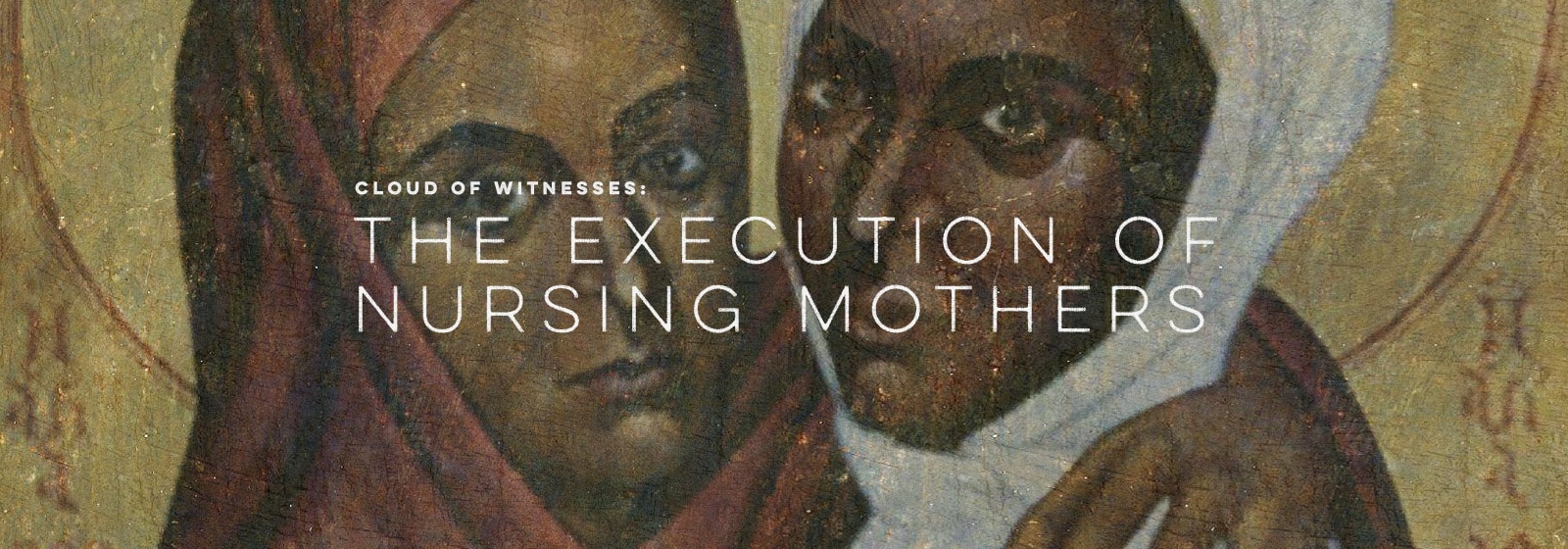We are in the midst of a blog series called “Cloud of Witnesses.” Each blog post in this series will highlight someone from church history who is worthy of note for his or her faith. It goes hand in hand with the sermon series we are beginning this Sunday by the same title focusing on the faith of those singled out in the book of Hebrews. On Tuesday Alastair looked at Thomas Cranmer, the author and editor of the Book of Common Prayer and one of the key players in the founding of the Anglican Church. Today however, I want to rewind all the way back to the early church and highlight two women whose faith is certainly exemplary: Perpetua and Felicity.
The year was roughly AD 203, and Septimius Severus – whose name just so happens to sound like a character from a Harry Potter novel – was on the throne of the Roman Empire. Even though Severus did not actively seek out Christians to be persecuted, if someone was accused of being a Christian, he or she would either have to curse Jesus and make an offering to the Roman gods – or they would be executed. Certain officials took a liking to this policy more than others, and so there was heavy persecution in Egypt, Africa and the eastern parts of the empire. It’s this context that produced the earliest remaining writing we have by a Christian woman: The Passion of St. Perpetua, St. Felicitas, and their Companions.
Not only is The Passion the product of a woman’s hand (a rare thing in the ancient world), but it really is also a woman’s story. It gives us a glimpse into the life of a Christian woman in the early church. Perpetua was a newly married noblewoman of about 22 – a Roman citizen – with a nursing child. Felicity was her slave, who also happened to be pregnant. They were both catechumens – those training for baptism – when they were placed under house arrest for their faith. During this time they were baptized and eventually they were jailed. This is how Perpetua described the prison:
A few days later we were lodged in the prison; and I was terrified, as I had never before been in such a dark hole. What a difficult time it was! With the crowd the heat was stifling; then there was the extortion of the soldiers; and to crown all, I was tortured with worry for my baby there.
Perpetua’s father was not a Christian, and he was desperate for her not to go through the execution. He tried to dissuade her from her belief while under house arrest, but she was firm in her faith. When she was jailed, he became even more desperate:
Have pity, my daughter, on my grey hairs! Have pity on your father, if I am worthy to be called a father by you. If with these hands I have brought you into the flower of your age, if I have preferred you to all your brothers, do not deliver me up to the scorn of men…Lay aside your courage, and so not bring us all to destruction; for none of us will speak in freedom if you should suffer anything.
In a time in which allegiance to Empire and family meant everything, Perpetua and Felicity placed their allegiance to Christ before any other.
Perpetua, however, would not be persuaded to set aside her faith. Not even her infant son could persuade her to deny Christ. When she was thrown into prison, she was separated from her baby. Some deacons bribed the guards to have her moved to a nicer part of the prison so she could nurse him, and arrangements were eventually made for her to keep him with her in prison. At her trial, her father pulled her aside and begged her to have pity on her son, but when the governor said to her, “Spare the infancy of your boy and offer sacrifice for the well-being of the emperors,” she said, “I will not do so.” The governor then asked her, “Are you a Christian?” and she replied, “Yes, I am a Christian.”
The death sentence was passed and that was the last time Perpetua saw her son.
In the days leading up to the execution, Felicity, who was eight months pregnant at the time, gave birth to a daughter. She was immediately handed over to a Christian sister to be raised. That was the last and only time Felicity saw her daughter.
On the day of the execution, the martyrs were led into the amphitheater. At the demands of the crowd, they were first beaten before a line of gladiators. Then a boar, a bear and a leopard were set on the men, and a wild cow on the women who had been stripped and put under a net. Perpetua was first struck by the cow and fell on her back. When she got up, she saw that Felicity had also been crushed to the ground. She went over to her, gave her a hand and lifted her up and the two stood side by side. Now wounded, the martyrs exchanged the kiss of peace and were put to the sword.
It is a tragic story. A story of two young women separated from their babies before they had even weaned them. But it’s so much more than that. It’s a radical statement about true allegiance. In a time in which allegiance to Empire and family meant everything, Perpetua and Felicity placed their allegiance to Christ before any other. It was also a time in which class lines – lines dividing Roman Citizens and their slaves – were rigid and unmoving. But this account, much like Paul’s letter to Philemon, places unity in Christ before any kind of class division. The fact that Perpetua and Felicity were master and slave does nothing to deter them from standing unified in amphitheater awaiting their execution. It is in this act that we see the embodiment of Jesus’ famous words:
And everyone who has left houses or brothers or sisters or father or mother or children or lands, for my name’s sake, will receive a hundredfold and will inherit eternal life.
We remember and celebrate the faith of Perpetua and Felicity because it is Christ who is the founder and perfecter of their faith.




